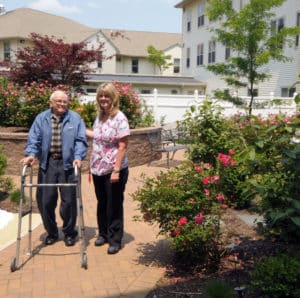Understanding Assisted Living Costs in NJ
Perhaps of most concern to potential residents and families are the costs of assisted living. Everyone knows that health care costs have skyrocketed in recent years. Many have heard stories about the expense of long-term care.
Typical questions include:
- How much does assisted living cost?
- Is there an upfront fee to buy an apartment or room at a community?
- Will I still be able to leave my house to my children?
- What kind of assets or income do I need to be eligible for residency?
- What if I live so long that I run out of money to cover my expenses?
- Are there any government programs that help me pay for assisted living?
- Are there special veterans’ benefits that help pay for assisted living?
- If my health needs change, will I have to move into another community?
As a not-for-profit Christian organization, United Methodist Communities may have answers to these questions that contrast with other high quality senior care communities.
Can I afford senior living?
Learn more about the resources that can be used to cover the costs of senior living and get a personalized summary in about 4 minutes without sharing details about your finances.
How Much Does Assisted Living Cost at United Methodist Communities?
Monthly assisted living costs vary depending on the community and the types of service you need. The base cost for living in our communities depends on the apartment and support services selected, as well as amenities such as:
- A daily meal or meals depending on your preference.
- Housekeeping and cleaning services.
- Building and apartment maintenance/handyman services.
- Water, gas and electric utilities.
- Security.
- Access to community enrichment activities, programs, events and outings.
- The easy companionship of others your own age. It’s not hard to make friends, but you also have privacy whenever you need it.
In general, and depending on the care you need, you can project between $5,000 and $10,000 a month. For more specific detail regarding assisted living service costs, contact the community directly.
Is There an Entrance Fee to Move In?
Most of our communities have a small community fee which goes toward the costs of establishing the programs, helping with move-ins, and setting up care services for new residents.
Will I Be Able to Leave My House to My Children?
It is a common misconception that moving into assisted living means signing over all your assets. Often, seniors are reluctant to sell their homes, full of meaning and family memories, and would prefer the property be part of the legacy they leave their children. But in many cases, seniors find maintaining a house increasingly difficult and seek a simpler lifestyle. Safety and maintenance become concerns for aging individuals who live alone. In these cases, assisted living yields a perfect opportunity to simplify life while improving the quality of your life.
Your home forms just one of the assets United Methodist Communities reviews when determining financial eligibility. Your ability to pay is determined from many factors. For instance, if the value of your house was used as part of your financial qualification you will be required to maintain that asset to pay for your stay.
What Kind of Assets or Income Do I Need to Qualify?
Financial qualification is based on a number of factors; primarily your age and care needs. A member of the sales team at any of our full-service communities can walk you through the steps to determine financial qualification.
What If I Live So Long That I Run Out of Money to Cover My Expenses?
Perhaps the most unique aspect of United Methodist Communities is our commitment to care for our residents. The ministry of the United Methodist Communities comes to life through the Gift of Care Circle, which supports and sustains our charitable mission. We depend upon family and friends who believe in our mission and partner with us to make compassionate faith-based care possible every day. To learn more about the Gift of Care Circle, who it benefits, or to make a donation in support of charitable care, click here.
We are very proud of our mission, history of service and care, and urge you to visit a United Methodist Communities campus.
Are there Government Programs That Can Help Me Pay for Assisted Living?
Qualified individuals can indeed receive assistance from government programs for the costs of long term care and assisted living. Veterans may qualify for Aid and Assistance programs, which can pay at least some of the costs of assisted living. There are eligibility requirements, so UMC recommends that individuals consult with a good elder law or estate planning attorney to obtain the best advice and information specific to their situations.
What If My Health Needs Change? Will I Need to Move to Another Apartment?

United Methodist Communities maintains five levels of assisted living at all its full-service communities. These levels ensure each resident can live in an apartment as long as possible, maintaining dignity and independence. At some point, residents may need to transfer to our memory support or healthcare residences if their care needs become too great for assisted living.
a visit!






